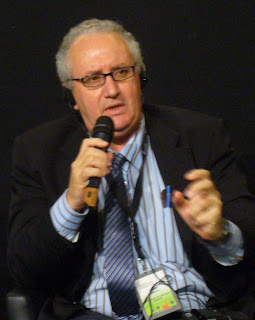 Chris Harris is deputy director for Greenpeace France. He was invited today to the conference on the relationships between NGOs and business.
Chris Harris is deputy director for Greenpeace France. He was invited today to the conference on the relationships between NGOs and business. "We came to this forum in order to discuss how companies can better manage their activities to act for the planet. Some companies talk, but it's simply to avoid doing. We are here today to confront the corporate world and the NGOs. Companies that are involved in a process of certification are already changing their way of thinking. A lot of companies do what they are doing because they had to face
environmental problems. They would not have come by themselves to the negotiation. I do not want to accept any compromise. NGOs that are funded by businesses may compromise their independence."
 Scott Poynton is the CEO of Tropical Forest Trust, a non-profit organisation that works with businesses in order to have them work with sustainably managed forests.
Scott Poynton is the CEO of Tropical Forest Trust, a non-profit organisation that works with businesses in order to have them work with sustainably managed forests."This forum is a healthy mix: companies are not always aware of the
environmental consequences of the products. They need NGOs to realize that.
There are two solutions: either NGOs campaign againt businesses, which is
useful. Or they can meet in places like here, which is healthy too. Greenpeace
wants to protect the forests for environemental concerns. Firms need the forests
for economic concerns. In the end, they all want the forests to be conserved:
having them to meet each other cannot hurt!"
Nancy Dale is the executive director of Action Against Hunger (United States).
"Although there are lots of biases on both sides, NGOs have to learn how to work
with businesses. In my organization, we are increasingly working with
businesses. We have a partnership with Weight Watchers: for each pound lost, one
pound is given. It is a win-win proposition. NGOs can have positive effects on
businesses, but the reverse is also true: NGOs are not so pure!"
Lire la suite...












